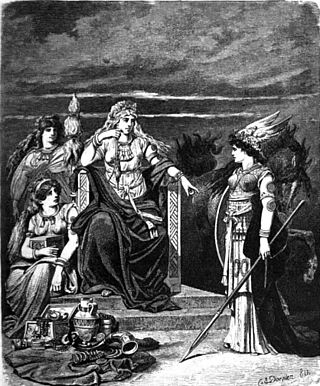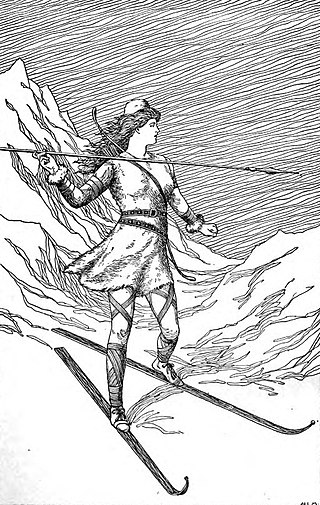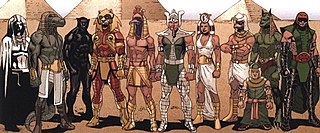
Frigg is a goddess, one of the Æsir, in Germanic mythology. In Norse mythology, the source of most surviving information about her, she is associated with marriage, prophecy, clairvoyance and motherhood, and dwells in the wetland halls of Fensalir. In wider Germanic mythology, she is known in Old High German as Frīja, in Langobardic as Frēa, in Old English as Frīg, in Old Frisian as Frīa, and in Old Saxon as Frī, all ultimately stemming from the Proto-Germanic theonym *Frijjō. Nearly all sources portray her as the wife of the god Odin.

In Norse mythology, Skaði is a jötunn and goddess associated with bowhunting, skiing, winter, and mountains. Skaði is attested in the Poetic Edda, compiled in the 13th century from earlier traditional sources; the Prose Edda and in Heimskringla, written in the 13th century by Snorri Sturluson, and in the works of skalds.

In Mesopotamian mythology, Lamashtu was a female demon/monster/malevolent goddess or demigoddess who menaced women during childbirth and, if possible, kidnapped their children while they were breastfeeding. She would gnaw on their bones and suck their blood, and was charged with a number of other evil deeds. She was a daughter of the Sky God Anu.

The Olympians are a fictional species appearing in American comic books published by Marvel Comics. These characters are based on the Twelve Olympians/Dii Consentes and other deities of Classical mythology. During the beginning of the 1960s, the exploits of the Asgardians Thor and his evil brother Loki demonstrated that an updating of ancient myths could again win readers. In 1965, Stan Lee and Jack Kirby introduced the Olympians in Journey into Mystery Annual #1.
The Norse mythology, preserved in such ancient Icelandic texts as the Poetic Edda, the Prose Edda, and other lays and sagas, was little known outside Scandinavia until the 19th century. With the widespread publication of Norse myths and legends at this time, references to the Norse gods and heroes spread into European literary culture, especially in Scandinavia, Germany, and Britain. In the later 20th century, references to Norse mythology became common in science fiction and fantasy literature, role-playing games, and eventually other cultural products such as Japanese animation. Storytelling was an important aspect of Norse mythology and centuries later, with the rediscovery of the myth, Norse mythology once again relies on the impacts of storytelling to spread its agenda.

Heliopolitans are a fictional group of gods, based on Ancient Egyptian deities, appearing in American comic books published by Marvel Comics.

Age of the Five is a trilogy of fantasy novels by Australian author Trudi Canavan; it consists of the novels: Priestess of the White, Last of the Wilds and Voice of the Gods. The fictional series recounts the story of Auraya, a young priestess who, after rising to the highest rank in her world's religious hierarchy, subsequently discovers that the gods she worships are significantly different entities from those in whom she was originally taught to believe.

Ludere Deorum is a Japanese visual novel by Nippon Ichi Software and Broccoli. It was released on October 24, 2013 for the PlayStation Portable. An anime television series adaptation by Sony Pictures Animation was announced in December 2013 and aired from April to June 2014. The opening theme for the anime was "Till the end", while the ending theme for the anime was "Reason for...". Both opening and ending theme were sung by Miyu Irino, Daisuke Ono, Yuto Uemura, Toshiyuki Toyonaga, Hiroshi Kamiya, and Yoshimasa Hosoya. A second game, In Finite Ludere Deorum, was released in April 2016.
God Is Dead is a comic book series created by Jonathan Hickman and Mike Costa, published by American company Avatar Press. It deals with ancient gods and goddesses from mythologies around the world coming to Earth to lay claim to the world of man. The subplot deals with a group of people named the Collective, who resist the ancient gods.

The Crown of Ptolemy is the third and last book in the Percy Jackson and the Olympians and The Kane Chronicles crossover series. It was released in the back of the paperback version of The House of Hades on March 31, 2015, and later as an ebook and audiobook. The ebook edition was released May 12, 2015.








